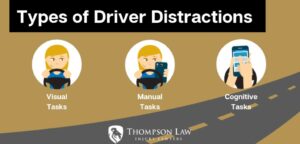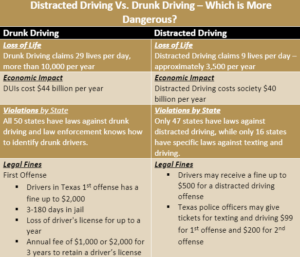
Former Dallas Cowboys alum Michael Irvin speaks out against distracted driving in the studio with car accident attorney Ryan Thompson. Distracted driving led to the deaths of 3,166 people in 2017 alone. Simply taking your eyes off the road for five seconds at 55 mph is like driving the length of a football field with your eyes closed.
We live in a world where we seemingly have unlimited access at the touch of a button. Our tech-savvy society comes with pressure to be connected at all times , even while driving. In a study conducted by Zebra on Americans’ driving behavior and attitudes, 37% of respondents aged 18-34 stated they felt a high degree of pressure to respond to work-related messages while driving. Distracted driving is right up there with drunk driving in terms of risk and danger. According to the Texas Department of Transportation , 1 in 5 car accidents in Texas is due to distracted driving—a proportion that hasn’t decreased over the past 4 years, even with the emerging emphasis on keeping our focus on the road .
“Texting and driving” and “distracted driving” may seem interchangeable, but distracted driving encompasses much more than simply checking your phone while driving. Distracted driving refers to any time you pay attention to anything other than the road while driving. There are several forms of distracted driving, including:
Distracted driving is dangerous and accounts for 9% of all fatal accidents . Distracted driving also has significant ramifications related to traffic safety, violations, and insurance rates.

According to the National Highway Traffic Safety Administration (NHTSA), there are three types of distracted driving:
1. Manual distraction – taking your hands off the wheel to do a task (reach for an item, adjust the radio, pet your dog, etc.)
2. Distracción visual – implica apartar los ojos de la carretera para mirar a otro lado (mirar un accidente, un mensaje de texto, los niños en el asiento trasero, el sistema de navegación, etc.)
3. Distracción cognitiva – involucra a un conductor que deja de pensar en conducir para soñar despierto, piensa en problemas laborales, piensa en otra cosa que no sea conducir

1. 62% – Generalmente distraído o “perdido en sus pensamientos”
2. 12% – Uso del teléfono celular
3. 7% – Persona, objeto o evento externo
4. 5% – Otros ocupantes
5. 2% – Utilizando o alcanzando por Un dispositivo en Carro
6. 2% – Comer o beber mientras conduce
7. 2% – Ajuste de los controles de audio o clima
8. 1% – Uso de dispositivos / controles a Operar vehículo
9. 1% – Objetos en movimiento
10. 1% – Relacionados con el tabaquismo
Como discutieron el ex vaquero y nuestro abogado de accidentes automovilísticos, t el un factor todo Estas distracciones comparten el hecho de que el conductor está prestando atención a algo más que conducir. La complacencia es la razón por la que muchos conductores sienten que pueden apartar la vista y la mente de la carretera. Una vez que los conductores se sienten cómodos, olvidan lo peligroso que puede ser, porque son complacientes con los riesgos de conducir.

Al 1 de septiembre de 2017, la La Legislatura de Texas aprobó una prohibición estatal en dispositivos de comunicación inalámbricos para mensajería electrónica mientras se opera un vehículo. Está prohibido enviar mensajes de texto, así como leer o escribir un correo electrónico mientras se conduce por las carreteras de Texas.
En Texas, los infractores por primera vez podrían enfrentar un cargo de delito menor y una multa de entre $ 25 y $ 99. Los infractores reincidentes podrían recibir una multa de hasta $ 200.
Las áreas locales pueden tener aprobaciones de ordenanzas más estrictas mientras que limitan por completo cualquier tipo de uso de teléfonos celulares mientras se conduce.

If you are the victim of an accident in which the other person was distracted —such as texting and driving—trust our car accident specialists and Cowboy alumnus Michael Irvin and contact the experienced team at Thompson Law as soon as possible. We offer no-obligation consultations during which we will review the details of your claim and explain all of your legal options. If you allow us to represent you, you will pay no fee unless we win your case. Contact us at 844-308-8180 .



Thompson Law NO COBRA HONORARIOS a menos que obtengamos un acuerdo para su caso. Hemos puesto más de $1.9 mil millones en acuerdos en efectivo en los bolsillos de nuestros clientes. Contáctenos hoy para una consulta gratuita y sin compromiso para hablar sobre su accidente, obtener respuestas a sus preguntas y comprender sus opciones legales.
La ley estatal limita el tiempo que tiene para presentar una reclamación después de un accidente con lesiones, así que llame hoy.